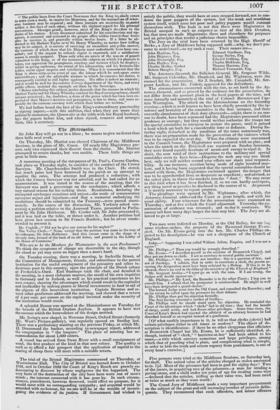Two men were indicted on Monday, at the Old Bailey,
for stet ling some window-sashes, the property of the Reverend George El ans, clerk. On Mr. Evans going into the box, Mr. Charles Phillips ob- jected to his description—he was not a clergyman of the Church of England.
Judge—" Supposing I was called William Julian, Esquire, and I was not a squire?"
Mr. Phillips—" Then you would be wrongly described." Mr. Evans—" I described myself as the minister of Brunswick Chapel, and they put me down as clerk. I act as secretary to several public societies."
Mr. Phillips—" Sir, you must not interfere : this is a question of law, and not of theology. I submit, that in order to constitute a clerk, the person as- suming the designation must have been ordained by a Bishop. If this is to be allowed, there's an end to the titles of the ministers of the Church of England." Mr. Sergeant Arabin—" I must go on with the case. If I am wrong, the Judges will decide against me."
Mr. Phillips—" My Lord, the Recorder is in the other Court ; I beg you to consult him. I submit that the prosecutor is misdescribed. He might as well have been designated a quack-doctor."
The learned Judgewent into the Old Court, and consulted the Recorder; and on his return he called upon the prisoners for their defence.
Mr. Phillips then put his objection formally.
The Jury having returned a verdict of Guilty—
Mr. Phillips said he should stand upon his objection. He reminded the Court of the advantages which "clerks" had in old time; they had the benefit of clergy, could write, and had divers other privileges. Some time since, the Court of King's Bench had rejected the affidavit of an attorney because he had described himself as an esquire instead of a gentleman.
[Of what earthly importance is it, to tell us that clerks (cleric° had certain privileges either in old- times or modern? The object of de- scription is identification: if there be no other clergyman that officiates at Brunswick Chapel but Mr. Evans, he is sufficiently identified, al- though, instead of" clerk," "barrister-at-law" had been added to his name,—a title which conveys numerous and large privileges, among which that of puzzling what is plain, and complicating what is simple, in order to hide the truth and screen roguery from punishment, is one of every hour's exercise.]


























 Previous page
Previous page